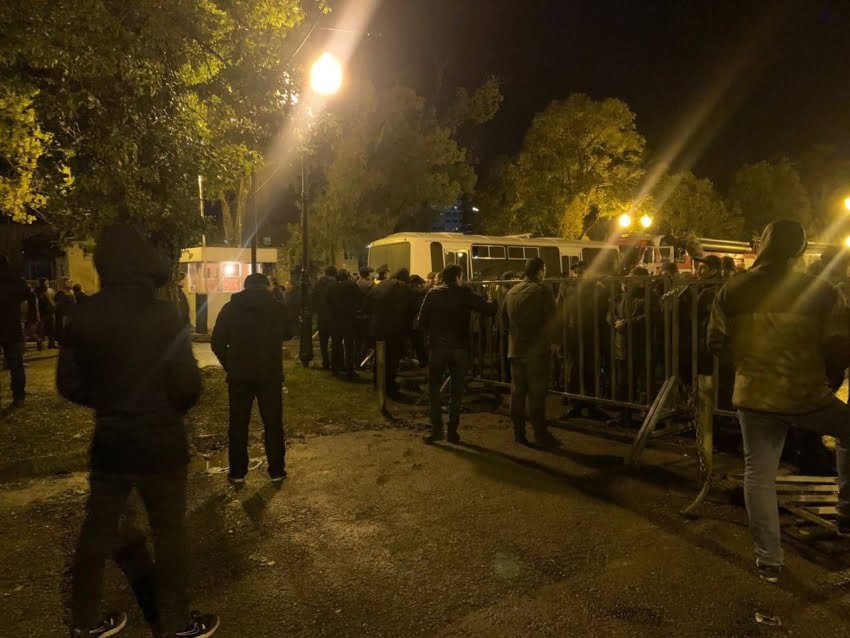Chaotic scenes unfolded in Sokhumi this evening, after an opposition demonstration, seemingly the strongest against current leader Aslan Bzhania since he came to power in April 2020, devolved into unrest, as protesters clashed with the police for hours and attempted to break into the legislature.
The rally was called by the freshly-established People’s Patriotic Union of Abkhazia (NPSA from Russian abbreviation), a group uniting several opposition outfits, that have grown increasingly dissatisfied with Bzhania’s leadership following a series of controversies over the year.
These include Abkhazia’s protracted energy and water supply crisis, handling of the COVID pandemic, Sokhumi shooting incident, concerns over law enforcement, Bzhania backing to “share sovereignty” with Moscow and sell property to Russians, and recent probe over a historic HPP privatization, now owned by opposition leader Kan Kvarchia. Opposition sees the investigation as political prosecution.
Opposition Unveils Demands after Talks with Bzhania
Following the tensions, opposition leaders Temur Gulia, Adgur Ardzinba and deputy legislature speaker Mikheil Sangulia entered the “parliament” building for talks with the Abkhaz leader, “prime minister” Alexander Ankvab and chief of Bzhania’s administration Alkhas Kvitsinia. This talks came as Bzhania’s refusal to meet opposition protesters after the first-round talks with opposition prompted clashes with police.
After the negotiations ended, opposition leader Akhra Bzhania unveiled the rally resolution, demanding to launch Aslan Bzhania’s impeachment process in “parliament,” where he does not have the backing of the majority. The opposition also wants to prolong the term of current legislature for a year and cancel scheduled “parliamentary polls” of March 12.
Also, Akhra Bzhania demanded moratorium on “all energy, property and foreign policy initiatives” taken under Aslan Bzhania’s leadership, the abolition of the prime ministerial office, switch from a fully majoritarian to a mixed parliamentary electoral system and to necessitate parliamentary approval for ministerial cabinet.
Adgur Ardzinba, one of the key opposition leaders and negotiators, told protesters after the negotiations, that Aslan Bzhania has promised to discuss the possible postponement of the parliamentary vote and to summarize the results of his cabinet’s work by the year, to make personnel decisions subsequently.
Ardzinba also said he opposes an “elected president” to leave the office before the term is up, but added that the move would still be warranted “if the president and his government do things that violate the interests of the people.”
Only around midnight the opposition protesters started to disband. Now Bzhania and the opposition have through New Year’s holidays to reach to a final compromise.
Earlier Developments, Underlying Concerns
The protesters first gathered in the afternoon outside the drama theater in downtown Sokhumi in what was an unauthorized demonstration as Abkhaz leadership in August outlawed mass public gatherings to curb COVID spread.
“Give us electricity and water!,” “We won’t allow Abkhazia to be sold!” “Apologize and leave!,” read the protest banners hanging on the drama theater.
Akhra Bzhania, leader of the Akhyatsa movement, slammed Aslan Bzhania’s controversial “foreign policy,” including his recent remarks over “sharing sovereignty” with Moscow and mentioning negotiations with Tbilisi in the foreign policy concept. The latter provision has since been removed after the opposition’s outcry.
The opposition leader also pointed to the energy crisis stemming from cryptocurrency mining, and “selective application of the law only to those people who are not supporters of the current government.”
Temur Gulia, chair of Aruaa, a group of hardline Abkhaz veterans of 1992-93 war against Georgia, said “Bzhania’s further stay in power will lead to the loss of independence of Abkhazia.” Referring to socio-economic hardships, Gulia noted that “for almost two years, we have not seen a single fulfilled election promise.”
Adgur Ardzinba, one of the leaders of NPSA and chair of opposition Abkhaz People’s Movement, was also cited as stating that “people who accidentally found themselves in power today do not understand the very concept of sovereignty… They have no idea how to run an independent state.”
Ardzinba further criticized the Abkhaz leader for not drawing any conclusions from the outrage that followed the Sokhumi shooting incident involving war veterans and police officials.
Failed First Round of Talks, Clashes
Following these addresses outside the drama theater, two of the opposition leaders, Temur Gulia and Aslan Bartsits met Aslan Bzhania to negotiate and relay the protesters’ demand for the Abkhaz leader to arrive at the demonstration and speak with the public.
An advisor to the Abkhaz leader, Nugzar Logua arrived at the rally following the negotiations and told the protesters Bzhania would not come out to the protest and violate his own decree on outlawing mass gatherings. Logua argued however that Bzhania was ready to sit down with the opposition in a few days after the situation calmed down to “discuss all issues of concern,” Apsnypress reported.
Tensions ramped up following Bzhania’s refusal to go to the rally, and protesters moved from the drama theater to the “parliament,” where they made several attempts to break the police cordon and storm the legislative building, clashing with the police.
Footage aired by Apsnypress Telegram channel shows protesters getting into and driving away one of the buses blocking off the area and around the legislative building in an apparent attempt to clear their path.
In another video, published by a Vkontakte page Accidents and emergencies / Sochi shows scores of protesters trying to flip a bus, followed by police officers supposedly setting off what seems to be a smoke grenade to clear the crowd. What seem to possibly be pyrotechnics are also set off, but it is unclear from the footage who launches them. Graphic Abkhaz TV videos showed its crew being attacked during the unrest.
Noteworthy, Bzhania himself came to power in snap elections of March 2020, called after massive protests against and Moscow-facilitated resignation of predecessor Raul Khajimba.
The article underwent multiple updates, including for clarity. The last update on 15:20, December 22.
Also Read:
This post is also available in: ქართული (Georgian) Русский (Russian)

